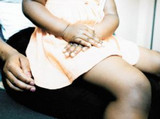
The writer argues that sexual predators groom children to trust them and then assault them. He laments that our courts appear not always to realise this.
The decision to overturn a child rapist’s sentence on appeal from life is absolutely horrifying, says Eusebius McKaiser.
Johannesburg - It is absolutely shocking that children are not only unsafe in our homes and at school where sexual predators lurk, but are also not guaranteed protection from them in our justice system.
This reality was, yet again, violently illustrated by a shocking story that was carried in The Citizen at the weekend.
Rapist Molefe Mphanama reportedly had his life sentence overturned on appeal in the North Gauteng High Court in Pretoria. It was replaced by an effective 20-year prison sentence instead for raping an 11-year-old child.
He had been convicted on four counts of rape. Two of the judges had argued that the girl had visited the rapist willingly, evidence for which included the fact that she had asked her mother whether she could visit him.
Apparently these judges also noted the girl first showed a lack of willingness only when she closed her thighs.
These facts were then used as a basis for imposing a sentence less harsh than life imprisonment. This reduced sentencing decision is absolutely shocking and should be widely condemned both within the legal fraternity and society at large.
First, have these judges never heard of grooming? The fact that a child may go to the house or room of a rapist is not evidence of consensual behaviour. Sexual predators groom children to trust them and they prey on that trust by then confusing them with violent acts like rape. The child then struggles to process what they were subjected to because they often hold the rapist in high regard.
The other known truth is that, in cases where there is not sexual grooming that preceded the rape, the rapist may simply have exerted power in the form of effective threats.
My hero in primary school was an older cousin who was a great role model to me and my sisters. He lived with us.
He would never back chat my parents. He would wash the dishes, clean the house, look after us when they were going to functions.
He used to take me with him when he, as a church youth leader, went to the local old age home to sing and pray for the elderly.
He also helped me with homework, teaching me high school algebra while I was still in primary school because he wanted to nurture my academic talent. And he was a student leader at the local high school. I was filled with pride when police came to look for him in the early hours of the morning once because of his political activism.
He raped me. Over a long period of time. I never screamed. I never complained. I never felt like a victim. After all, he is my hero and can’t do wrong surely?
It is simple what happened to me. I was groomed. So well, in fact, that I feel melodramatic even now saying “I was raped”.
I feel like I am lying. Because he was my hero.
Now back to this stupid darn case in the news. Why on earth do these judges think an 11-year-old child is capable of engaging a bully, a predator, like an adult?
Second, this reduced sentence is also legally ridiculous.
Let’s assume the unlikely for a second. Assume the judges are right and that this girl somehow willingly had sex with an adult. Assume that possibility.
Even if that is true, we make laws for the general population and not for exceptions, and judges must enforce the laws before them, not the laws they wish existed.
The bottom line is that minors cannot, legally, consent. And so it is irrelevant that you, cruel judge, think that a smiling 11-year-old is asking for consensual sex.
The law forces you to deem that child to not have been wiling in any way. For good reason: to protect 99.9 percent of children who, in reality, do not consent.
To then deem the child an adult, effectively, during the sentencing stage of the case is to undermine the very philosophical legal basis of the concept “statutory rape”.
Third, no one should be trained to know children do not volunteer to be raped. But another legal disappointment is that this an appeal court sitting that we are evaluating. It is not even a lower court, involving one inexperienced magistrate, say, that got it horribly wrong. It is an appeal court, a court that exists to correct errors from those below. That is a real disappointment.
All of this is a reminder that being trained in law does not guarantee that you have compassion for the vulnerable, or regard for social realities like the violence children and women suffer daily. These judges aren’t worthy of that title.
By: Eusebius McKaiser
McKaiser studied at Rhodes University
Article Source: The Star
